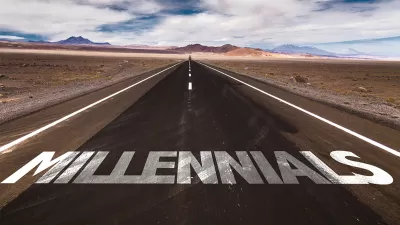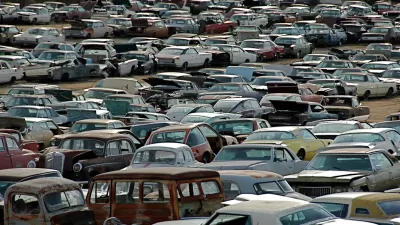If you thought inflation and fuel efficiency, along with politicians unwillingness to raise gas taxes were the main causes of America's decaying road and bridges, S&P adds another contributing factor—millennial transportation preferences.

Millennials are not directly responsible for that pothole you may have just driven through - but their "driving and vehicle purchasing habits—or lack thereof—greatly contribute to the decreased collection of the federal gas tax," writes Kathleen Burke for MarketWatch. And the Highway Trust Fund, where those gas taxes are deposited, is what funds much of the road repair on the interstate highway system.
The millennial blame can be found in S&P's Oct. 19 economic research report, "Millennials Are Creating Unsafe Conditions On U.S. Roads--But Not In The Way You Might Think (pdf)," written by Beth Ann Bovino and Geoffrey E Buswick,
Burke analyzes rates of licenses issued, VMT, public transit usage, and millennial preference for green cars. She omits biking and carshare though—both greatly associated with millennial travel preferences.
But it's not just preferences that are responsible for millennials not propping-up the Highway Trust Fund as other generations have done, observes the Financial Times on the new report.
A major one is the economy: Wages among younger workers have been depressed, while unemployment and underemployment remain high. On top of that, the generation which was born from 1982-2000, also tends to start families later in life, perhaps halting moves into the suburbs where driving is more common.
S&P's report contradicts, to some extent, Yonah Freemark's post that we can't expect millennials to save us from our auto-dependent ways. We may still be a nation of drivers, regardless of millennial travel preferences, but their transportation biases are impacting our ability to pay for road upkeep.
Hat tip to Jennifer Scholtes, transportation reporter for POLITICO Pro.
FULL STORY: Too many potholes? Blame millennials

Alabama: Trump Terminates Settlements for Black Communities Harmed By Raw Sewage
Trump deemed the landmark civil rights agreement “illegal DEI and environmental justice policy.”

Planetizen Federal Action Tracker
A weekly monitor of how Trump’s orders and actions are impacting planners and planning in America.

The 120 Year Old Tiny Home Villages That Sheltered San Francisco’s Earthquake Refugees
More than a century ago, San Francisco mobilized to house thousands of residents displaced by the 1906 earthquake. Could their strategy offer a model for the present?

In Both Crashes and Crime, Public Transportation is Far Safer than Driving
Contrary to popular assumptions, public transportation has far lower crash and crime rates than automobile travel. For safer communities, improve and encourage transit travel.

Report: Zoning Reforms Should Complement Nashville’s Ambitious Transit Plan
Without reform, restrictive zoning codes will limit the impact of the city’s planned transit expansion and could exclude some of the residents who depend on transit the most.

Judge Orders Release of Frozen IRA, IIJA Funding
The decision is a victory for environmental groups who charged that freezing funds for critical infrastructure and disaster response programs caused “real and irreparable harm” to communities.
Urban Design for Planners 1: Software Tools
This six-course series explores essential urban design concepts using open source software and equips planners with the tools they need to participate fully in the urban design process.
Planning for Universal Design
Learn the tools for implementing Universal Design in planning regulations.
Clanton & Associates, Inc.
Jessamine County Fiscal Court
Institute for Housing and Urban Development Studies (IHS)
City of Grandview
Harvard GSD Executive Education
Toledo-Lucas County Plan Commissions
Salt Lake City
NYU Wagner Graduate School of Public Service





























